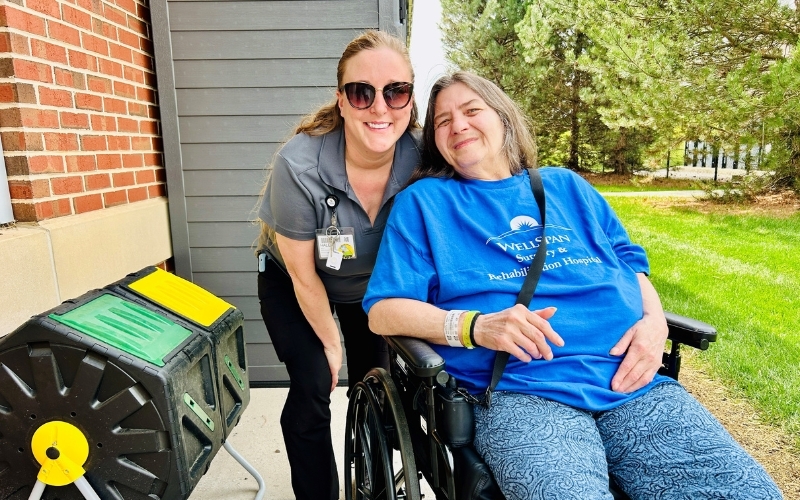Patients will be able to participate in the full cycle of gardening with the addition of a composting program to the therapy gardens at WellSpan Surgery and Rehabilitation Hospital.
The composting program – which debuted on Earth Day on April 22 – gets patients involved in every step of the gardening process as they recover from strokes, brain injuries, amputations, spinal cord injuries and other illnesses leading to hospitalization.
In 2020, the hospital built seven 4-by-6-foot raised beds behind the hospital. Patients grow flowers and fresh produce including zucchini, peppers, eggplants, tomatoes, herbs and pumpkins in the beds, gaining the benefits that come from the movement and planning that goes into planting and harvesting a garden.
The addition of the composting program actually grew out of a “Green Deeds Day,” designed to celebrate and support environmental practices, that was part of WellSpan’s annual team member celebration in August, called 30 Days of Fun. Joleen Hill, a physical therapist and manager of inpatient rehab services, suggested the hospital add the composting program and recreational therapist Haley Smith took the idea and ran with it.
The hospital added two mini composting bins to collect food scraps and other compostable items in its therapy kitchen and staff office, educating patients and team members on what to put in the bins. Outside in the gardens, it added a large bin where patients dump these items and regularly turn the bin. The compost from the large bin eventually will be added to the gardens to enrich the soil and the plants grown there. The hospital donates the food grown in the gardens to a local food bank.
“Gardening helps patients with things such as walking, balance, direction following and other tasks,” Haley says, noting that the activity resonates with many patients who have gardened at their homes or come from farming backgrounds. “It’s purposeful, it’s meaningful and they are contributing. It brings them so much satisfaction when they are dealing with injuries that can be very challenging.”
Pam Hardesty is one of those patients who gardens. She worked hard every day during her rehabilitation so she would be in good shape to plant cucumbers, tomatoes, peppers and onions at her home this summer. She uses compost, made of things like onion scraps and coffee grounds, so she knows the value it will bring to the hospital gardens.
Pam says gardening is good therapy inside and outside of the hospital.
"What you get out of (gardening) is good,” she says. “What you put into it, you get out of it. And with compost, it will be really good."

Therapist Haley Smith and patient Pam Hardesty with the large composter near the therapy garden.
Tags:

